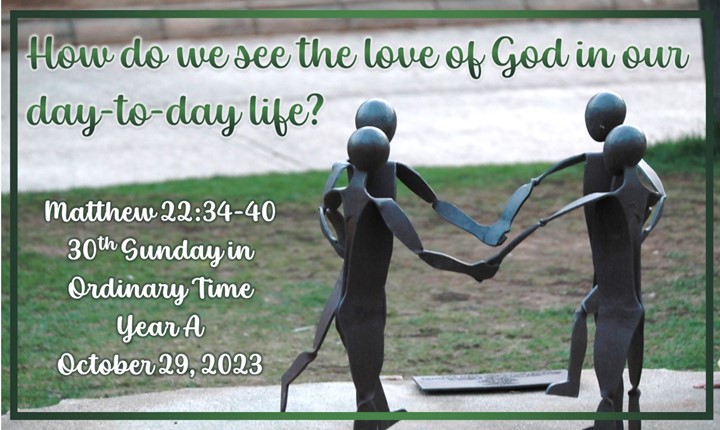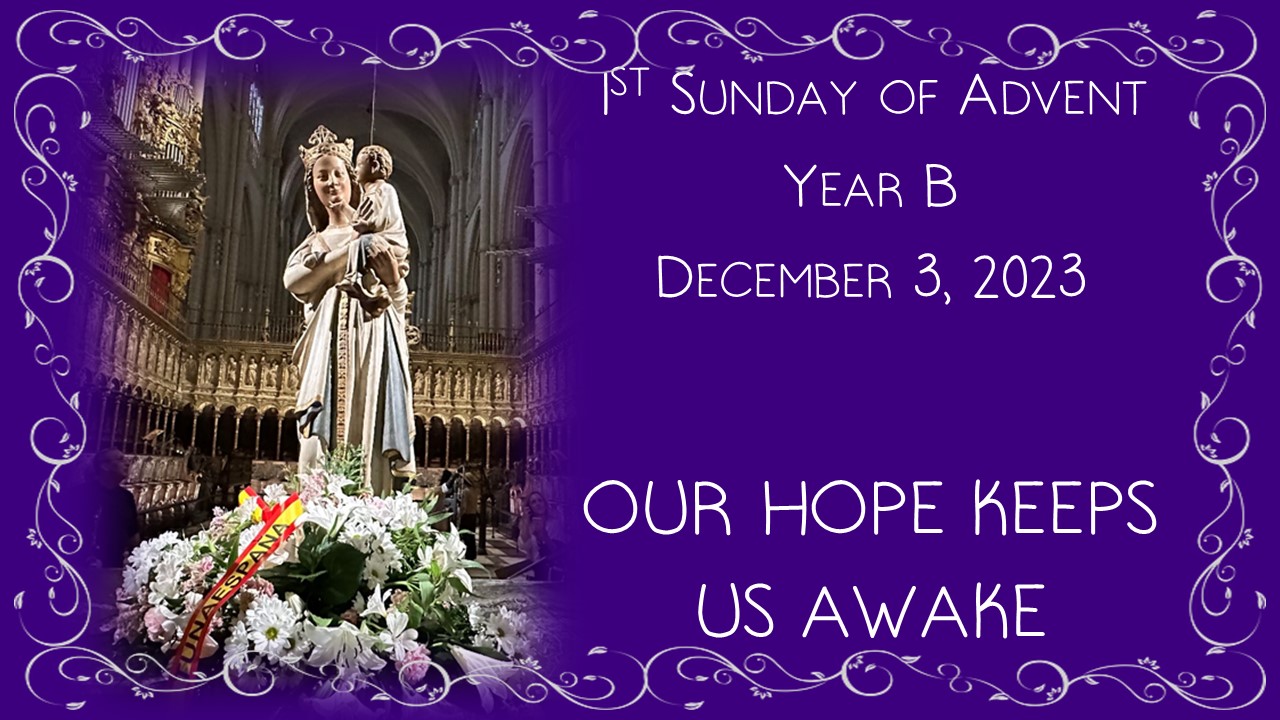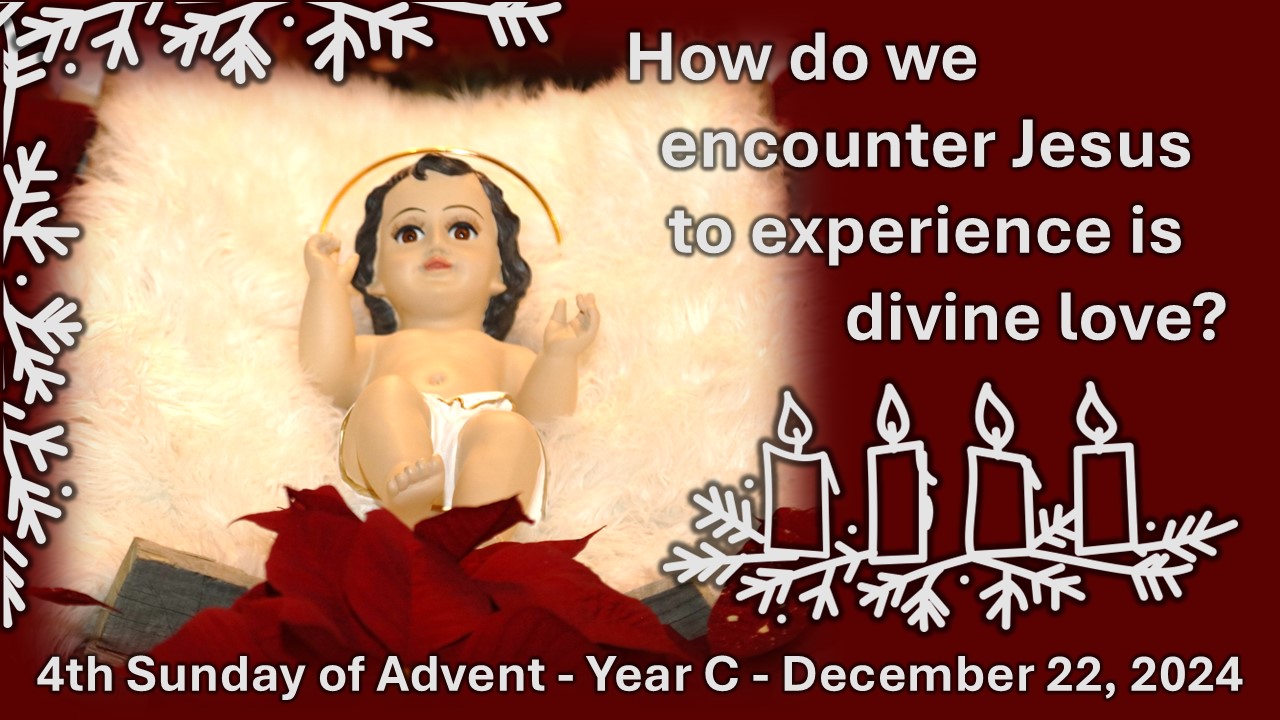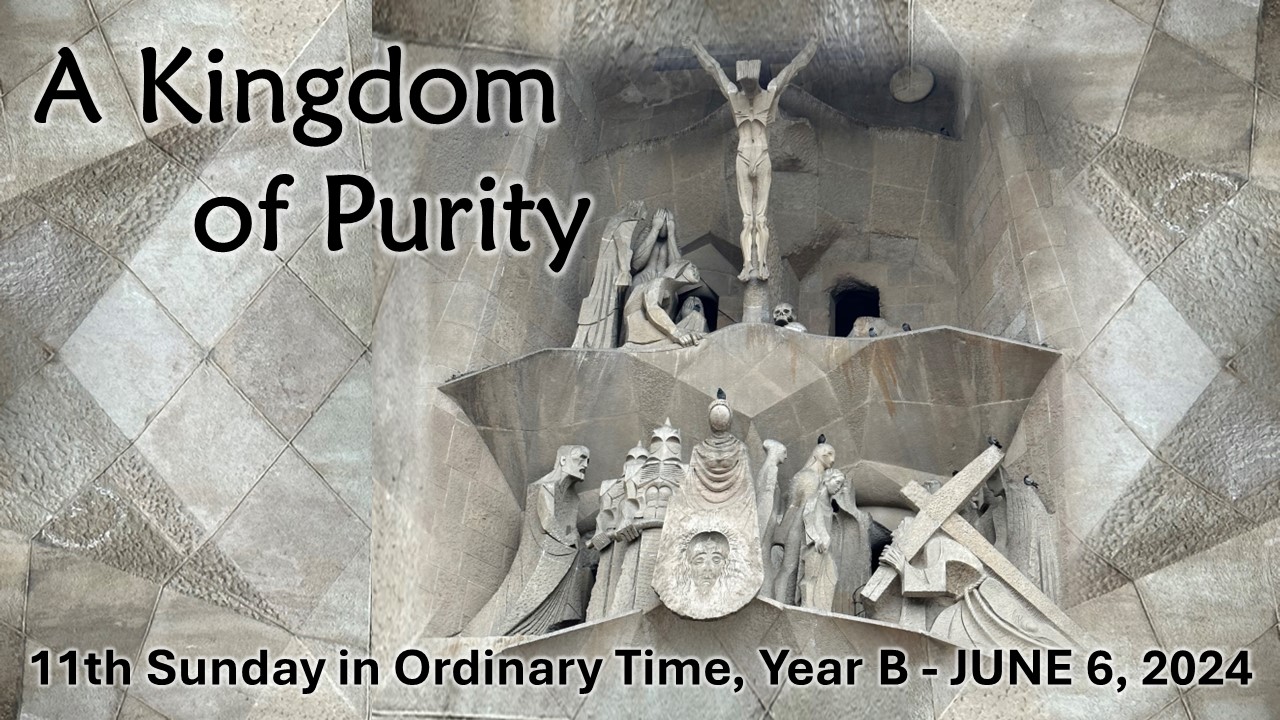
30th Sunday in Ordinary Time – Year A ~ October 29, 2023
GOD’S LOVE
St. Augustine being the Father of the Church and a great Theologian explains our relationship with God the Father who is all love and forgiving and abounding in steadfast love: For example: May you receive glory among all the nations as you have among us, and may your prophets prove themselves faithful. What does this mean but Hallowed be your name? Lord of power and might, touch our hearts and show us your face, and we shall be saved. What does this mean but Your kingdom come? Direct my ways by your word and let no sin rule over me. What does this mean but Your will be done on earth as it is in heaven? Do not give me poverty or riches. What does this mean but give us this day our daily bread? Lord, remember David and all his patient suffering, and Lord, if I have done this, if there is guilt on my hands, if I have repaid evil for evil … What does that mean but forgive us our trespasses as we forgive those who trespass against us? Rescue me, God, from my enemies, deliver me from those who rise up against me. What does this mean but deliver us from evil?
If you study every word of the petitions of Scripture, you will find, I think, nothing that is not contained and included in the Lord’s Prayer. When we pray, then, we may use different words to say the same things, but we may not say different things.
We should not hesitate to make these prayers for ourselves, for our friends, for strangers, and even for enemies, though the emotions in our heart may vary with the strength or weakness of our relationships with individuals. You now know, I think, the attitudes you should bring to prayer, as well as the petitions you should make, and this not because of what I have taught you but thanks to the teaching of the one who has been pleased to teach us all. We must search out the life of happiness, we must ask for it from the Lord our God. Many have discussed at great length the meaning of happiness, but surely, we do not need to go to them and their long drawn-out discussions. Holy Scripture says concisely and with truth: Happy are the people whose God is the Lord. We are meant to belong to that people, and to be able to see God and live with him forever, and so the object of this command is love from a pure heart, from a good conscience and a sincere faith. In these three qualities, “a good conscience” stands for “hope.” Faith, hope, and love bring safely to God the person who prays, that is, the person who believes, who hopes, who desires, and who ponders what he is asking of the Lord in the Lord’s Prayer.
A wealthy man and his son loved to collect rare works of art. They had everything in their collection from Picasso to Raphael. They would often sit together and admire the great works of art. When the war broke out in the country, the son was asked to join the army. He was very courageous and died in battle while rescuing another soldier. The father was notified and grieved deeply for his only son. About a month later, just before Christmas, there was a knock at the door. A young man stood at the door with a large package in his hands. He said, “Sir, you don’t know me, but I am the soldier for whom your son gave his life. He saved many lives that day, and he was carrying me to safety when a bullet struck him in the heart, and he died instantly. He often talked about you, and your love for art.” The young man held out his package. “I know this isn’t much. I’m not really a great artist, but I think your son would have wanted you to have this.”
The father opened the package. It was a portrait of his son, painted by the young man. He stared in awe at the way the soldier had captured the personality of his son in the painting. The father was so drawn to the eyes that his own eyes welled up with tears. He thanked the young man and offered to pay him for the picture. “Oh, no sir, I could never repay what your son did for me. It’s a gift.”
The father hung the portrait over his mantle. Every time visitors came to his home; he took them to see the portrait of his son before he showed them any of the other great works he had collected. As man grew old, he decided to auction all his collection.
There was to be a great auction of his paintings. Many influential people gathered, excited over seeing the great paintings and having an opportunity to purchase one for their collection. On the platform sat the painting of the son. The auctioneer pounded his gavel. “We will start the bidding with this picture of the son. Who will bid for this picture?” There was silence. Then a voice in the back of the room shouted, “We want to see the famous paintings. Skip this one.” But the auctioneer persisted. “Will someone bid for this painting? Who will start the bidding? $100, $200?” Another voice shouted angrily, “We didn’t come to see this painting. We came to see the Van Goghs, the Rembrandts. Get on with the real bids!” But still the auctioneer continued, “The son! The son! Who will take the son?”
Finally, a voice came from the very back of the room. It was the long-time gardener of the man and his son. “I’ll give $10 for the painting.” Being a poor man, it was all he could afford. “We have $10, who will bid $20?” “Give it to him for $10. Let’s see the masters.” “$10 is the bid, won’t someone bid $20?” The crowd was becoming angry. They did not want the picture of the son. They wanted the more worthy investments for their collections. The auctioneer pounded the gavel. “Going once, twice, SOLD FOR $10!”
A man sitting on the second row shouted, “Now, let’s get on with the collection!” The auctioneer laid down his gavel. “I’m sorry, the auction is over.” “What about the paintings?” “I am sorry. Whoever bought that painting would inherit the entire estate, including the paintings. The man who took the son gets everything!” God gave his Son 2000 years ago to die on a cruel cross. Much like the auctioneer, His message today is, “The Son, the Son, who’ll take the Son?” Because you see, whoever takes the Son gets everything.
Today’s Word of God is giving us the same message to treat everyone with love and respect. In the First Reading we read “you shall not wrong or oppress a resident alien, for you were aliens in the land of Egypt”. This reminds us to treat people with love. Along with the pandemic world has witnessed the protest against racism where people stood against the evil forces trying to divide people on the basis of race, colour and religion. God has created us equal, and he wants us to treat other people equally and with love. The love does not do wrong as St. Paul says. (Please read 1 Corinthians 13:1-13)
Chapter 22 of the Gospel of Matthew has series of questions. Though begins with parable of the wedding banquet (1-14) which has first question “friend how did you get here without the wedding rob? Second question “is it lawful to give taxes to the emperor? Third question is about the Resurrection; will there be resurrection after the death? The fourth question is about the greatest commandment; which is the greatest commandment in the Law? and the fifth is about the Son of David: what do you think about the Messiah?
This Sunday presents to us a very important Gospel passage (Mt 22:34-40). Matthew the Evangelist recounts that the Pharisees assemble in order to put Jesus to the test. One of them, a lawyer, asks him this question: “Teacher, which one is the great commandment in the law?” It is an insidious question, because more than 600 precepts are mentioned in the Law of Moses. How should the great commandment be distinguished among these? But Jesus responds without hesitation: “You shall love the Lord your God with all your heart and with all your soul and with all your mind”. And he adds: “You shall love your neighbor as yourself”.
This response of Jesus is not to be taken for granted, because, among the numerous precepts of the Hebrew Law, the most important were the 10 Commandments, communicated directly by God to Moses, as the conditions of the Covenant with the people. But Jesus wants to make it understood that without love for God and for our neighbour there is no true fidelity to this Covenant with the Lord. You may do many good things, fulfil many precepts, many good things, but if you do not have love, this serves no purpose.
It is confirmed by another text in the Book of Exodus, the so-called “Covenant Code”, where it is said that one cannot adhere to the Covenant with the Lord and mistreat those who enjoy his protection. And who are those who enjoy his protection? The Bible says: the widow, the orphan and the stranger, the migrant, that is, the most lonely and defenseless people (Ex 22:20-21). In responding to those Pharisees who question him, Jesus also tries to help them put their religiosity in order, to distinguish what truly matters from what is less important. Jesus says: “On these two commandments, depends on all the law and the prophets” (Mt. 22:40). They are the most important, and the others depend on these two. And Jesus lived his life precisely in this way: preaching and practising what truly matters and is essential, namely, love. Love gives impulse and fruitfulness to life and to the journey of life: without love, both life and faith remain sterile.
What Jesus proposes in this Gospel passage is a wonderful ideal, which corresponds to our heart’s most authentic desire. Indeed, we were created to love and to be loved. God, who is Love, created us to make us participants in his life, to be loved by him and to love him, and with him, to love all other people. This is God’s “dream” for mankind. And to accomplish it we need his grace; we need to receive within us the capacity to love which comes from God himself. Jesus offers himself to us in the Eucharist for this very reason. In it we receive Jesus in the utmost expression of his love, when he offered himself to the Father for our salvation.
St. John in his First Letter shows why we should love God and our neighbour without partiality: “See what love the Father has given us, that we should be called children of God; and that is what we are. The reason the world does not know us is that it did not know him. Beloved, we are God’s children now; what we will be, has not yet been revealed. What we do know is this: when he is revealed, we will be like him, for we will see him as he is. And all who have this hope in him purify themselves, just as he is pure” (3:1-3).
In the response of Jesus there is another mystery is hidden and that is if God has loved the world so much that the gave his only Begotten Son, then why can’t we love him without partiality. St. John continues to say “Beloved, let us love one another, because love is from God, everyone who loves is born of God and knows God. Whoever does not know love does not God, for God is love”.
In effect, the visible sign a Christian can show in order to witness to his love for God to the world and to others, to his family, is the love he bears for his brothers. The Commandment to love God and neighbour is the first, not because it is at the top of the list of Commandments. Jesus does not place it at the pinnacle but at the centre, because it is from the heart that everything must go out and to which everything must return and refer.
In the Old Testament, the requirement to be holy, in the image of God who is holy, included the duty to care for the most vulnerable people, such as the stranger, the orphan and the widow. Jesus brings this Covenant law to fulfilment; He who unites in himself, in his flesh, divinity and humanity, a single mystery of love.
Now, in the light of this Word of Jesus, love is the measure of faith, and faith is the soul of love. We can no longer separate a religious life, a pious life, from service to brothers and sisters, to the real brothers and sisters that we encounter. We can no longer divide prayer, the encounter with God in the Sacraments, from listening to the other, closeness to his life, especially to his wounds.
In the middle of the dense forest of rules and regulations — to the legalisms of past and present — Jesus makes an opening through which one can catch a glimpse of two faces: the face of the Father and the face of the brother. He does not give us two formulas or two precepts: there are no precepts nor formulas. He gives us two faces, only one real face, that of God reflected in many faces, because in the face of each brother, especially of the smallest, the most fragile, the defenseless and needy, there is God’s own image. And we must ask ourselves: when we meet one of these brothers, are we able to recognize the face of God in him? Are we able to do this?
In this way, Jesus offers to all the fundamental criteria on which to base one’s life. But, above all, He gave us the Holy Spirit, who allows us to love God and neighbour as He does, with a free and generous heart. With the intercession of Mary, our mother, let us open ourselves to welcome this gift of love, to walk forever with this two-fold law, which really has only one facet: the law of love.
Remember this: love is the measure of faith. How much do you love? Each one answer silently. How is your faith? My faith is as I love. And faith is the soul of love. How would my life be without Love?
St. Clement I, pope and martyr invite everyone to fix our eyes on the Father by saying; “Let us fix our gaze on the Father and Creator of the whole world and let us hold on to his peace and blessings, his splendid and surpassing gifts. Let us contemplate him in our thoughts and with our mind’s eye reflect upon the peaceful and restrained unfolding of his plan; let us consider the care with which he provides for the whole of his creation. By his direction the heavens are in motion, and they are subject to him in peace. Day and night fulfill the course he has established without interfering with each other. The sun, the moon and the choirs of stars revolve in harmony at his command in their appointed paths without deviation. By his will the earth blossoms in the proper seasons and produces abundant food for men and animals and all the living things on it without reluctance and without any violation of what he has arranged. Yet unexplored regions of the abysses and inexpressible realms of the deep are subject to his laws. The mass of the boundless sea, joined together by his ordinance in a single expanse, does not overflow its prescribed limits but flows as he commanded it. For he said: Thus far shall you come, and your waves will be halted here. The ocean, impassable for men, and the worlds beyond it are governed by the same edicts of the Lord. The seasons, spring, summer, autumn, and winter, follow one another in harmony. The quarters from which the winds blow function in due season without the least deviation. And the ever-flowing springs, created for our health as well as our enjoyment, unfailing offer their breasts to sustain human life. The tiniest of living creatures meet in harmony and peace. The great Creator and Lord of the universe commanded all these things to be established in peace and harmony, in his goodness to all, and in overflowing measure to us who seek refuge in his mercies through our Lord Jesus Christ; to him be glory and majesty for ever and ever. Amen”.
Let me finish with my reflection with this very inspiring story which reveals to us that we never walk alone in spite of our suffering and pain because God walks with us.
A man married a beautiful girl. He loved her very much. One day she developed a skin disease. Slowly she started to lose her beauty. It so happened that one day her husband left for a tour. While returning he had an accident and lost his eyesight. However, their married life continued as usual. But as days passed, she lost her beauty gradually. Blind husband did not know this and there was not any difference in their married life. He continued to love her, and she also loved him very much. One day she died. Her death brought him a great sorrow. He finished all her last rites and wanted to leave that town. A man from behind called and said, “Now, how will you be able to walk all alone? All these days your wife used to help you”. He replied, “I am not blind. I was acting, because if she knew l could see her skin condition due to a disease, it would have pained her more than her disease. I didn’t love her for her beauty alone, but I fell in love with her caring and loving nature. So, I pretended to be blind. I only wanted to keep her happy”.
How do we see the love of God in our day-to-day life?
Other Sermons In This Series

1st Sunday of Advent- Year B ~ December 3, 2023
December 01, 2023

4TH SUNDAY OF ADVENT YEAR C ~ DECEMBER 22, 2024
December 19, 2024

11th Sunday in Ordinary Time, Year B – JUNE 6, 2024
June 14, 2024

